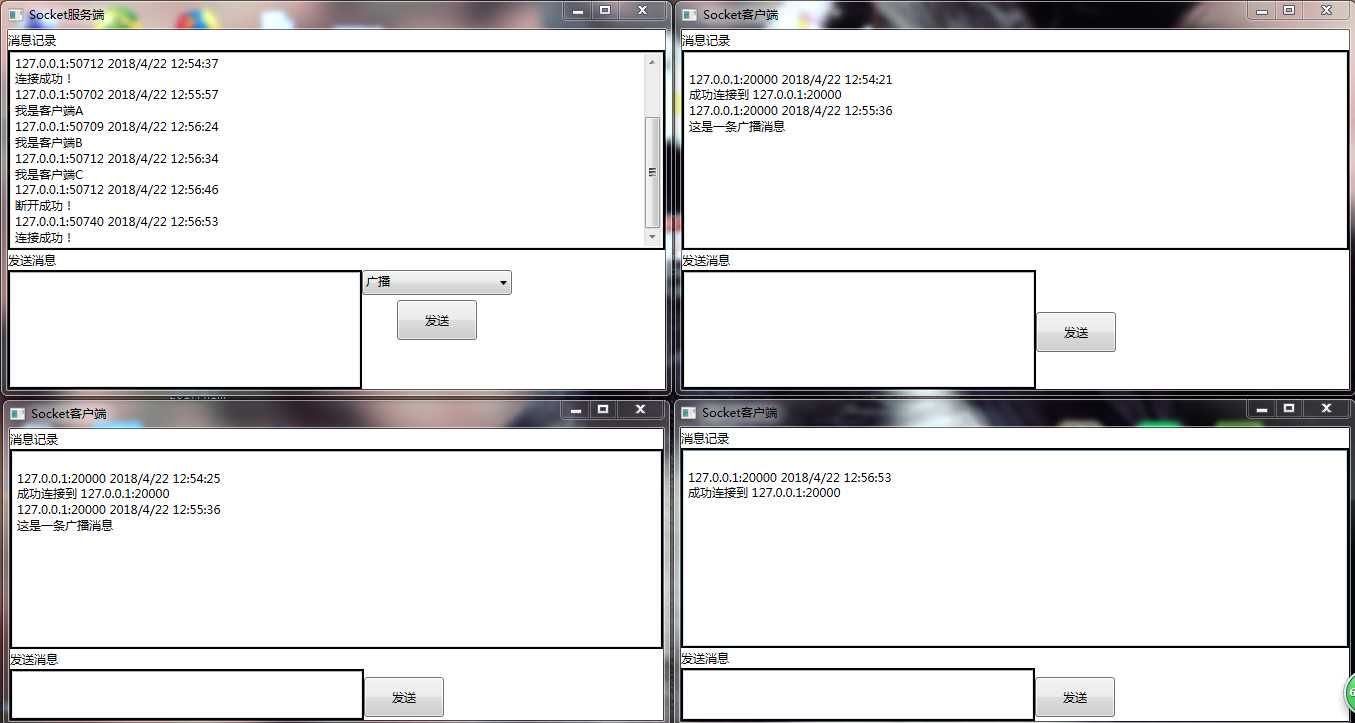c#之异步Socket通信
2021-04-14 23:28
标签:odi soscw 字节 ring 最大 一个 rev work rar 0.基于上一篇的c#之Socket(同步)通信,在几个大神评论之后,发现是有挺多地方不足的,所以写了一个改进版本的基于c#的异步Socket通信。再加深一下对Socket的使用和理解。其中客户端和服务端均采用WPF界面,实现了心跳,断线重连,一个服务端对应多个客户端的功能。 一.服务端 1.1 先创建一个Socket实例,并绑定到20000端口号;通过Listen方法开始监听并设置最大监听数量。 1.2 开始异步监听客户端,使用的是BeginAccept与EndAccept,当有客户端连接后会自动调用回调函数,此时开始心跳并将客户端的Socket与心跳等信息加入到全局字典中去。 1.3 接收数据,当上一步中有客户端连接成功后,即可开启异步接收来自客户端的数据;使用的是BeginReceive与EndReceive,当接收到来自客户端的数据后,会自动调用回调函数。由于接收到的数据的大小不确定,所以这里每次接收1024字节,然后将接收到的数据拼接起来,用到Available 属性,为可读取的字节数,如果小于等于0,说明此次数据接收完毕。 1.4 发送数据,用到的是BeginSend与EndSend,发送成功后会自动调用回调函数,其中EndSend()方法返回成功发送的字节数量 二.客户端 2.1 新建Socket实例并开始异步连接到服务端,用到的是BeginConnect与EndConnect,连接成功会自动调用回调函数,此时可开始心跳,接收发送数据。 2.2 发送与接收数据(与客户端类似) 三.运行示例 四.总结 假如上述描述,或者代码逻辑中有任何问题,希望各位大神帮忙指出来,谢谢! 其中需要注意的地方如下: 4.1.在异步接收数据的时候,因为接收到的数据大小是不确定的,所以暂定每次只接收1024字节,根据Available判断,如果接收到的数据大于1024字节,则依次拼接得到的数据。 4.2 在服务端中,每次接收到1024字节的byte[]不能定义成全局变量,而需要与每个Socket客户端一一对应,否则再接收来自多个客户端的消息时会出错。(这边我理解是这样) 源码下载地址如下:AsyncSocketDemo.rar c#之异步Socket通信 标签:odi soscw 字节 ring 最大 一个 rev work rar 原文地址:https://www.cnblogs.com/liyijin/p/8906687.html//新建一个Socket服务端实例,并绑定到20000端口
this.socketServer = new Socket(AddressFamily.InterNetwork, SocketType.Stream, ProtocolType.Tcp);
this.socketServer.Bind(new IPEndPoint(IPAddress.Any, 20000));
//设置最大监听数量
this.socketServer.Listen(10);
this.socketServer.BeginAccept(ar =>
{
Socket _socket = socketServer.EndAccept(ar);
//开始心跳
System.Timers.Timer heartbeatTimer = new System.Timers.Timer();
heartbeatTimer.Interval = 600000;
heartbeatTimer.Elapsed += new System.Timers.ElapsedEventHandler((s, e) => heartbeatTimerIsUp(s, e, _socket));
heartbeatTimer.Start();
SocketInfo info = new SocketInfo();
info.heartbeatTimer = heartbeatTimer;
this.socketInfoDic.Add(_socket, info);
//开始接收数据
thdRevMethod(_socket);
//开始下一次监听
ListenSocket();
}, null);
Socket _socket = obj as Socket;
if (this.socketInfoDic.ContainsKey(_socket))
{
SocketInfo socketInfo = socketInfoDic[_socket];
//开始接收消息
_socket.BeginReceive(socketInfo.tempByte, 0, socketInfo.tempByte.Length, SocketFlags.None, ar =>
{
try
{
int resInt = _socket.EndReceive(ar);
socketInfo.contentByte = socketInfo.contentByte.Concat(socketInfo.tempByte).ToArray();
socketInfo.tempByte = new byte[1024];
if (_socket.Available 0)
{
int actualLength = socketInfo.contentByte.Length - (socketInfo.tempByte.Length - resInt);
string res = Encoding.Default.GetString(socketInfo.contentByte, 0, actualLength);
socketInfo.contentByte = new byte[0];
}
thdRevMethod(_socket);
}
catch (SocketException sex)
{
if (sex.SocketErrorCode == SocketError.ConnectionReset)
{
//当客户端断开连接,从列表中移除该客户端
if (this.socketInfoDic.ContainsKey(_socket))
{
this.socketInfoDic.Remove(_socket);
}
}
}
catch (Exception ex)
{
MessageBox.Show("程序出现异常:" + ex);
}
}, null);
}
byte[] byteStr = Encoding.Default.GetBytes(msg);
_socket.BeginSend(byteStr, 0, byteStr.Length, SocketFlags.None, ar =>
{
_socket.EndSend(ar);
}, null);
// 新建客户端实例,并连接到服务端所在的端口号
this.socketClient = new Socket(AddressFamily.InterNetwork, SocketType.Stream, ProtocolType.Tcp);
//连接到服务端
this.socketClient.BeginConnect("127.0.0.1", 20000, ar =>
{
try
{
this.socketClient.EndConnect(ar);
this.thdRevMethod();
}
catch (SocketException sex)
{
if (sex.SocketErrorCode == SocketError.ConnectionRefused)
{
this.reconnectTimer.Start();
this.heartbeatTimer.Stop();
}
}
catch (Exception)
{
this.heartbeatTimer.Stop();
throw;
}
}, null);
